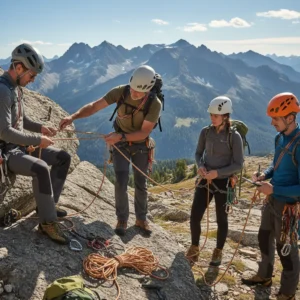More Than Miles and Medals
When most people think of endurance sports, they picture sweat-soaked athletes grinding through marathons, triathlons, or long mountain climbs. On the surface, these pursuits may look like tests of physical strength and stamina. But ask anyone who’s dedicated themselves to endurance training, and they’ll tell you: the lessons go far beyond the finish line.
Endurance sports — running, cycling, swimming, mountaineering, or ultra events — reveal truths about resilience, patience, and perspective. They mirror life’s challenges in surprising ways, shaping not just stronger bodies but stronger minds and character.
Here are the most profound life lessons endurance sports can teach us.
1. The Value of Patience
Training for endurance events isn’t about instant gratification. Preparing for a marathon or a long-distance cycling event takes months, sometimes years. Every mile, every interval, every recovery day adds up slowly.
Life Parallel: The same patience applies to career growth, relationships, or personal goals. Big achievements rarely happen overnight — they’re built through small, consistent steps.
2. Discipline Beats Motivation
Motivation may get you started, but discipline keeps you moving when the weather is bad, when you’re tired, or when progress feels slow. Endurance athletes know that skipping workouts can cost them later.
Life Parallel: In life, motivation fades. The real success comes from showing up consistently — to work, to practice, to commitments — even when you don’t feel like it.
3. Learning to Manage Discomfort
Endurance sports demand comfort with discomfort. Sore muscles, long hours, fatigue — they’re part of the process. Athletes learn the difference between good pain (growth) and dangerous pain (injury).
Life Parallel: Growth in life often comes from leaning into uncomfortable situations — tough conversations, new challenges, or risks that push us outside our comfort zone.
4. The Power of Mental Resilience
Ask any ultra-runner or mountaineer: the body often gives up long before the mind does. Training the mind to stay focused, calm, and determined is often the key to finishing.
Life Parallel: Mental resilience helps us navigate job losses, personal setbacks, or unexpected obstacles. If you can keep moving forward in a race, you can keep moving forward in life.
5. Small Wins Lead to Big Success
Endurance training is built on milestones: your first 5K without stopping, your first century ride, or your first climb past base camp. Each small victory builds confidence and momentum.
Life Parallel: In personal growth, small wins — like saving your first $100, mastering a new skill, or developing a daily routine — accumulate into life-changing progress.

6. Community and Support Matter
Despite the image of solitary runners or climbers, endurance sports thrive on community. Training groups, pacers, climbing partners, and cheering crowds provide encouragement and accountability.
Life Parallel: No one succeeds entirely alone. Having mentors, friends, colleagues, and loved ones makes the journey more rewarding and achievable.
7. The Importance of Recovery
Athletes know progress doesn’t happen during workouts but during recovery. Rest, sleep, nutrition, and downtime allow the body to adapt and grow stronger.
Life Parallel: Life also demands balance. Burnout happens when we work nonstop. Taking breaks, resting, and caring for ourselves make us more effective in the long run.
8. Setting Big Goals Changes You
Signing up for a marathon or a multi-day trek changes your mindset immediately. It forces you to train differently, think long-term, and step into a new version of yourself.
Life Parallel: Big life goals — starting a business, writing a book, or moving to a new country — transform us because they require growth beyond our current abilities.
9. Humility and Respect for Nature
Mountaineering, trail running, or open-water swimming remind us that nature is bigger than we are. Weather, terrain, and conditions often dictate the outcome, no matter how strong we feel.
Life Parallel: Life constantly reminds us that we don’t control everything. Humility and adaptability are key to navigating uncertainty.
10. Finishing Is More Important Than Winning
For most endurance athletes, the goal isn’t to beat others — it’s to cross the finish line. The journey, effort, and self-discovery matter more than the medal.
Life Parallel: Success in life isn’t about competing with others. It’s about defining and achieving goals that are meaningful to you.
Real Stories, Real Lessons
-
The Marathoner: Someone who trains through setbacks, injuries, and early mornings learns that perseverance matters in all areas of life.
-
The Cyclist: Long solo rides teach patience, planning, and how to handle obstacles like flat tires — lessons that translate to navigating life’s “roadblocks.”
-
The Mountaineer: Hours of climbing in harsh conditions foster respect for preparation, teamwork, and humility before nature.
Each endurance sport tells a similar story: when you push beyond what you thought possible, you discover strengths you never knew you had.

How to Apply These Lessons Without Running a Marathon
Not everyone wants to run an ultra or climb Everest, but the principles apply universally:
-
Set long-term goals — break them into manageable steps.
-
Stay disciplined — show up daily for your commitments.
-
Build resilience — learn to manage discomfort and keep perspective.
-
Value recovery — balance ambition with rest and reflection.
-
Celebrate milestones — acknowledge progress at every stage.
The essence of endurance isn’t about sports; it’s about adopting a mindset of persistence, patience, and growth.
Final Thoughts
Endurance sports are more than physical challenges. They are life lessons disguised as long runs, grueling climbs, and endless miles. They teach us patience when progress is slow, resilience when setbacks hit, and joy in small victories along the way.
Whether you’re an athlete or not, you can take inspiration from endurance sports: life is a marathon, not a sprint. The goal isn’t just to go fast — it’s to go far, to keep moving forward, and to grow stronger with every step.
So the next time you lace up for a run, hop on a bike, or simply tackle a long day with persistence, remember: you’re practicing endurance. And endurance, more than anything, is what helps us thrive in life.







